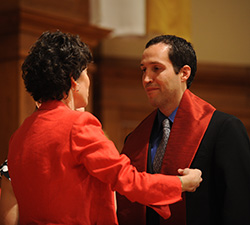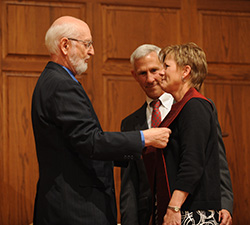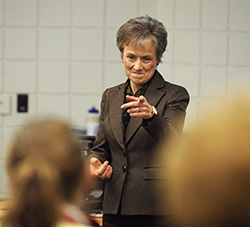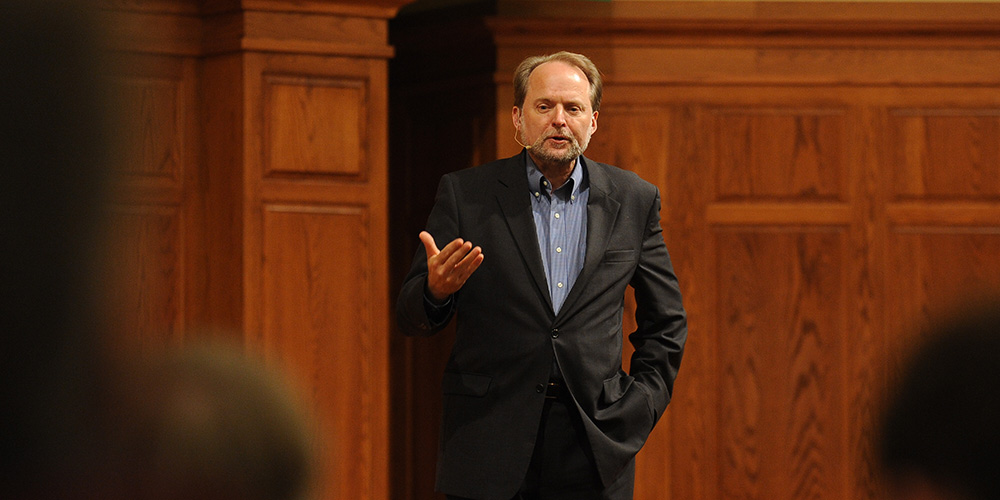Equipping and empowering others through servant leadership in the church and in business was the theme of Hesston College’s 13th annual Anabaptist Vision and Discipleship Series Oct. 26 to 28.
More than 130 church and business leaders gathered on the Hesston College campus for the weekend conference with the theme “Top-down Servant Leadership: Redefining Leadership for Business and the Church.”
The theme played well into what was also a celebration weekend for 25 years of the college’s Pastoral Ministries program. About 30 of the program’s alumni, former faculty members and spouses spent part of the weekend connecting with one another, reminiscing about the start of their pastoral training at Hesston and reflecting on the program’s place in the church and world.
“Hesston College has not just been about developing leaders for 25 years, but for its entire existence,” said Tim Lichti, program director since 2010.
Lichti noted that one of the founders’ purposes for Hesston College was to be a place of biblical training and for preparing people for ministry.
Over the last 25 years, the program has trained 134 graduates, about 40 of whom are currently active pastors. In addition, more than 180 active pastors in Mennonite Church USA congregations list Hesston College as part of their education.
“Hesston College has responded well to the church’s call to provide leaders and to offer an opportunity for students for whom seminary is not option,” said Lichti.

Graduates and students shared about their experience in the program. Many, like Shawn Nolt, had been out of school for many years, had established careers and families whom they uprooted to move to Kansas for two years.
Nolt, a 2009 graduate, has served the Salem Mennonite Church congregation in Shickley, Neb., since he graduated. In 2007 he left behind a job as IT director and engineering support for a tractor manufacturing company and moved his wife, Suzanne, and three young daughters from Ohio to Hesston.
“I chose Hesston College Pastoral Ministries because I knew some pastors who had come through the program and they were professional, compassionate and relational,” said Nolt. “I had been serving my home church as I discerned my call to ministry, and I wanted a quick and valuable course of study that would get me into the local church as soon as was responsibly possible.”
Several graduates and students mentioned that while they were going through the process of discerning their call to ministry, considering Hesston College, a move and a change in their life’s direction, they felt like they were the only ones who had dealt with the changes. Shared and familiar experiences, changes and emotions helps to quickly build relationships and lasting bonds.
“The bond between pastoral ministries students is quickly built through the daily relationships of class, formation and experiencing life outside of classes together,” said Nolt. “While each family’s story is unique, there is a similar thread of struggling through the call and responding in faith. We also recognized our need for mutual guidance and support in the program and in the ministry to come.”
Hesston College’s Pastoral Ministries program is unique to most other pastoral training programs in the fact that the majority of pastoral training comes through seminaries and advanced degrees.
“It’s not reasonable to expect every pastor to go to seminary and have a master of divinity degree,” said Ervin Stutzman, executive director of Mennonite Church USA who was one of the presenters for the weekend. “I have an appreciation for Hesston’s program. It serves a great need in the church for training pastoral leaders.”
The program meets crucial needs for those considering ministry – a two-year course of study for the non-traditional student for whom seminary is not an option and the ability for pastors to consider a bi-vocational ministry – while offering practical pastoral training.
“The program’s founders had a vision that they worked hard to deliver on,” said Jim Mininger, who served as academic dean when the program was founded in 1987 and who played a part in organizing the program in its beginning stages. “But the real heroes are those who entered the program, who sacrificed and made faith decisions to answer the call.”
Once classes and internships are completed and practice sermons delivered and critiqued, Hesston College Pastoral Ministries graduates are prepared to lead their own congregations.

“All children of God have a ministry,” said 2009 graduate Karen Dalke, pastor of Des Moines Mennonite Church. “My responsibility is to help the people in my congregation unleash their creativity as we serve God by serving others. The Pastoral Ministries program gave me the tools I needed to be successful in that mission. My Hesston College Experience is the strong foundation I received that I continue to build on.”
The servant leadership that the weekend conference focused on wasn’t just a resource for pastors, but was one that can be applied by all church leaders, congregants and business leaders who desire to empower their employees and minister through their work.
Many recognized names in business and the church presented during the weekend, including the keynote speaker, Dr. John Stahl-Wert, a recognized expert in organizational leadership and an international bestselling author on the topic.

The idea of servant leadership meets the needs of both the leader and the follower, employer and employee, pastor and congregant, in a mutually beneficial and empowering way. With this model, people are able to relate to one another on a comfortable and more personal level.
Just as Hesston College Pastoral Ministries has served its students and the church as a model for leadership training and a champion for the culture of call for many years, so it will continue its mission in the future.
“The program grew me and became one of the most meaningful experiences of my life,” said Dalke. “Thank you Hesston College and Hesston College Pastoral Ministries for partnering with God in walking with your students.”


